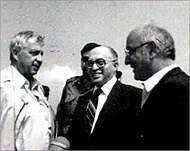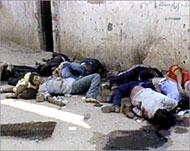Remembering Sabra and Shatila
The piles of bloated corpses and the overwhelming stench of rotting flesh are still crystal clear memories in Mahir al-Srour al-Marei’s mind.

It was 16 September 1982 in the Sabra and Shatila Palestinian refugee camp in Beirut, and the sounds of gunfire echoed throughout the densely packed, impoverished area.
A thick cloud of uneasiness lingered over Israeli-occupied west Beirut. Two days earlier, Phalange militia leader and Lebanon’s president Bashir Jmayil had been assassinated after only three weeks in power.
The militia, close to Israel, blamed Palestinians for his death.
As the rattling of battle became more insistent, Mahir’s father told him to go to a nearby relative’s house and bring her back. Mahir, then 15, recalls venturing out with his sister Suad, then 18, into the night. Electricity had been cut off after Israel’s savage bombing of west Beirut.
“We arrived at the home of Abu Yasir’s, who had the largest bomb shelter in the neighbourhood,” said Mahir. Outside, rows of men lined the streets.
“We thought they were asleep. It was normal then to sometimes sleep outside because the shelter would become too full,” said the photo-journalist. The shelter was empty. “Then my sister screamed, ‘run, they’re all dead,’ ” he said.
As Israeli flares lit up the skies, Mahir looked at the bodies in the street and realised his neighbours were dead.
This is just one of his memories of the three-day Sabra and Shatila massacre.
Bloodbath
|
“When they saw her still moving, they shot her in the head. I saw her brains blown out.” Mahir al-Srour al-Marei, Palestinian survivor of Sabra and Chatila massacre |
For 62 hours, members of the Phalange militia went on a rape and murder spree, butchering women, babies and the elderly – all under the watchful eye of Ariel Sharon, 200 metres away, on the rooftop of the Kuwaiti embassy.
Sharon, then Israel’s defence minister, had overall responsibility for the occupation forces and according to the Geneva Conventions, to protect civilians.
The decision to send in Phalangists to “mop up” the camps as Sharon had put it, was made two days before Jmayil was killed, according to historians and journalists.
Israeli forces had completely surrounded the camp a day before the rampage, and forced fleeing civilians to return.
They often met their deaths.
Some of the dead had been mutilated or disembowelled before or after they were killed, according to investigations after the massacre.
Journalists who arrived at the scene after the rampage saw clear evidence of the summary execution of young men.
Moris Draper, the US special envoy to the Middle East at the time, said he cabled Sharon after the killings began, telling him:
“You must stop the slaughter…The situation is absolutely appalling. They are killing children. You have the field completely under your control and are therefore responsible for that area.”
Saving Shadya
 |
|
Sharon(L) with then Israeli PM |
Militiamen pounded on Mahir’s door on the morning of the 17th, after seeing a neighbour on the rooftop. His father opened the door after they lobbed a bomb at the house.
Armed and covered in blood, the militants surveyed the terrified family.
“One man said to the others, ‘You haven’t shot them yet? This is how you shoot’, and he started shooting,” said Mahir in the steady tone of someone who has re-visited this memory many times.
From his hiding place in the bathroom, Mahir saw his family being executed. Amid screams, the militiamen murdered his father; Bassam, 13; Farid, six; Shady, four and Shadya, one and a half.
“Shadya was trying to crawl towards me. She was looking at me and screaming and saying, ‘dada’. When they saw her still moving, they shot her in the head. I saw her brains blown out,” he said in a dead voice. She slumped over between her dead father and mother, who had been injured, but not killed.
“I wanted to help her – and he (militiaman) killed her. And I couldn’t do anything,” he said after a pause. “I won’t forget that feeling.”
Response
|
A day after multinational forces evacuated Beirut, Sharon claimed “2000 terrorists” were still in the camps. He sent an order to the Israeli command saying the “mopping up” would be carried out by the Phalange. |
The exact number of victims will never be known. The International Committee for the Red Cross initially counted 1500 bodies at the time, but by 22 September this count had risen to 2400. The next day, another 350 corpses were uncovered, raising the total to 2750.
However, this toll does not include those still unaccounted for, buried in mass graves or carted away by militiamen, never to be seen again.
On 16 December 1982, the UN General Assembly condemned the massacre and declared it to be an “act of genocide”.
And in 1983, a three-member Israeli commission of inquiry, charged with investigating the massacre known as the Kahan Commission, found Sharon along with other Israelis, personally responsible for the massacre.
Sharon resigned as defence minister, only to become prime minister in 2001, sending a shudder throughout the Arab, and the world.
Open wounds
Mahir’s sister Suad was seriously injured in the legs, making it impossible for her to escape after the militiamen had left their home.
Mahir, his brother Ismail who had taken refuge with him, left with their mother, believing they could find her an ambulance.
For three days, she laid among the quickly rotting corpses of her family. She was raped at least once during that period by militiamen.
 |
|
Images the Palestinians will never |
Suad is one of 23 survivors bringing a case against Sharon in Belgium, under the country’s law of universal jurisdiction for acts of genocide and crimes against humanity.
Under the 1993 law, Belgian courts could try suspects for war crimes, crimes against humanity and genocide, regardless of where the alleged incidents took place or the accused’s nationality.
But under intense US and Israeli pressure, the law has been amended so that now a Belgian prosecutor will have to decide which cases fall under the law’s jurisdiction.
Israel’s prime minister, responsible for what has been described as “among the most heinous crimes of the 20th century” has never been punished.
Mahir, however, believes his sister’s efforts are futile because “she has no power and money and the world is power and money.”
He then falls into a short silence, contemplating the thousands who were butchered. “Sometimes I feel like talking about this. Sometimes I feel it’s worthless. No one wants to listen.”
Back to top